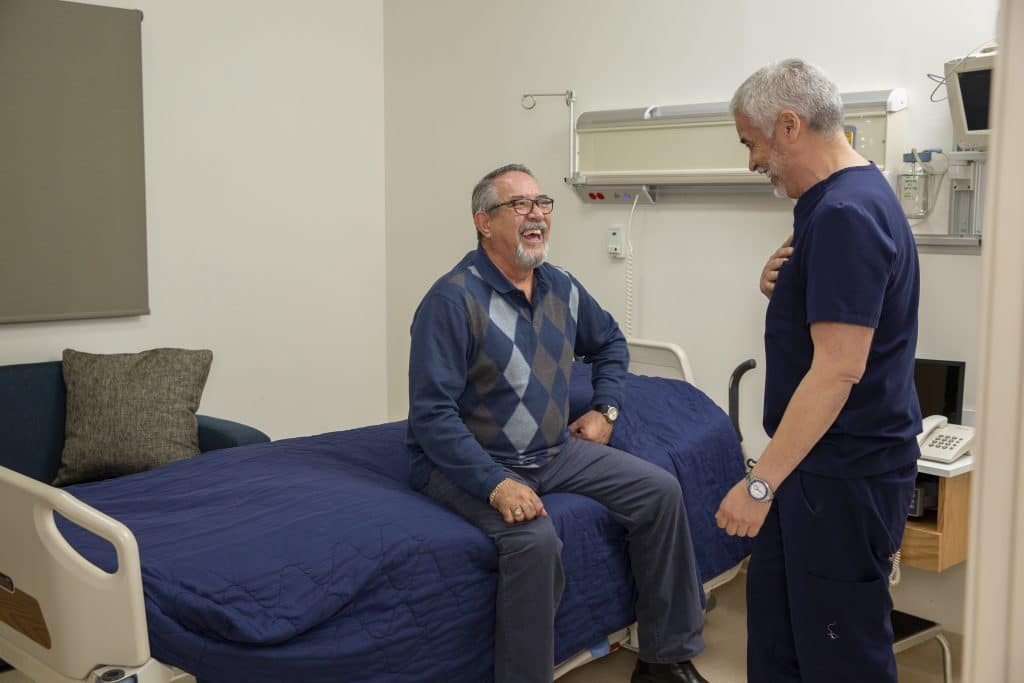
What do popular diets like Atkins and Keto have in common? They’re centered around low-carb foods, because cutting carbs has been a proven weight-loss tool for decades. However, the key to long-term weight loss success is much more than simply following a diet. A diet is temporary – a short-term plan with a target date. In some cases, the experience may feel more like a punishment rather than a rewarding opportunity. Successful, long-lasting weight loss relies on a lifestyle change that focuses on a longer, healthier, and happier life, instead of constant calorie counting.
At Obesity Control Center®, just minutes south of San Diego, we understand how weight loss and metabolic health depend on your eating choices. Nutrition is at the core of long-term success. At our surgical center, we are committed to optimizing cellular health through nutrient-rich food and supplements. You will foster your body’s natural ability to repair itself. At the end of the day, the weight loss journey is a healing process –one that is driven by an eating mindset. Below, we explain how limiting your carb intake will help you lose weight and keep it off.
The Problem with Carbs
Carbohydrates are one of the three main food groups (the other two are protein and fat) that your body needs to function properly. Carbs give your body energy. However, if the body does not immediately need to break down the carbs for energy as you eat them, your body will store them in the muscles and liver for later use. What happens if the body does not end up using those stored carbs? Your body converts them to fat.
Insulin is the hormone that encourages fat and muscles to absorb glucose from the blood. Insulin is also responsible for promoting fat storage in the body. When you consume foods high in refined carbohydrates, your body will release more insulin to absorb glucose from the blood. An increased insulin response may lead to increased fat storage and eventually, the dreaded weight gain.
>

> >
Benefits of a Low-carb Diet
Going “low-carb” has become a buzzword when it comes to living a healthy lifestyle, and for good reason. In most scientific research, limiting carb intake proves to be healthy and beneficial. These benefits include:
Lower Triglycerides
Triglycerides are fat molecules that circulate in the bloodstream, and one of the main drivers of elevated triglycerides is carb consumption and a sedentary lifestyle. High triglyceride levels may lead to accumulation in the veins, restricting blood flow to the heart and increasing the risk of a heart attack. Going low-carb can drop triglyceride levels, keeping your heart healthy.

>
Decreased Blood Sugar Levels
After breaking down in your body, carbs turn into sugar. Consuming too many carbs will lead to higher blood sugar levels and spikes in insulin production. A low-carb lifestyle reduces sugar levels, which also lowers your risk of developing diabetes.
Steadier Energy Levels
Fluctuations in sugar levels mean fluctuations in energy levels as well. A low-carb lifestyle will help bring your blood sugar and your energy levels to a more predictable baseline – a natural calibration that will eliminate the typical feeling of sluggishness during the afternoon.
Feeling Full Longer
With a low-carb lifestyle, you won’t feel hungry all the time. Eating fewer carbs and consuming more lean proteins and healthier fats can cause you to feel fuller longer, helping you eat less.
> >
No More Bloating
Your body stores excess carbs as glycogen, which attracts water. For each gram of glycogen comes two to three grams of water attached to it. The higher your carb intake (particularly if your body doesn’t use it for fuel right away), the more bloated you feel.
Weight Loss
Weight loss is one of the top reasons for going low-carb. Cutting carbs can switch your body into a fat-burning machine. How? Extra glucose is stored in the liver and muscles, and some of it is converted to body fat. The main goal of a low-carb lifestyle is to limit fat storage, so the body burns stored fat for energy, leading to weight loss. You won’t even need a scale to track your progress, because you will likely notice your jeans fitting more comfortably over time. To read more, please visit mayoclinic.org.
No More Counting Calories
When you live a low-carb lifestyle, there is no need to worry about the numbers. Losing weight should not be about tracking carbs, but being more mindful of them. The focus becomes consuming fewer carbohydrates and loading up on more protein and healthy fats. This approach allows you to naturally limit carb intake without fixating on the numbers.
Decreased Sugar Cravings
Whenever you eat sugary, high-carb foods, your body produces feel-good chemicals like serotonin and dopamine. Almost like a drug, these chemicals make you want to seek them out constantly. When you limit your carb intake, cravings will disappear and you won’t be so reliant on sugary foods any longer.
Long-Term Health
Unlike strict fad diets, a low-carb lifestyle is more sustainable. There is no deprivation, only moderation. It’s all about making smarter food swaps and still enjoying food without counting calories. This makes it easier to maintain the lifestyle long-term.
>

> >
Foods to Avoid
The list of high carb foods to avoid contains many sweet treats, as well as a few common items you might consider meal staples.
Examples of refined and high-carb foods you should avoid are:
- White bread
- White rice
- Starchy vegetables like potatoes
- Pasta
- Cookies, cakes, and pastries
- Candy
- Sugary beverages like soda and juice
Foods to Love
Generally, a low-carb lifestyle’s menu will include foods that are higher in protein and healthy fats.
Foods to load up on include:
- lean meats, such as sirloin, chicken breast, or pork
- fish
- eggs
- leafy green vegetables
- cauliflower and broccoli
- nuts and seeds, including nut butter
- oils, such as olive oil and coconut oil
- some fruit such as blueberries, apples, and strawberries
- unsweetened dairy products including low-fat milk and plain Greek yogurt
> >
Changing Your Mindset

>
To achieve weight loss success, you must rethink your relationship with food. Food is replenishment fuel and not a reward or treat. It’s all about nutrition – and longevity, wellbeing, and overall health are inextricably dependent on it.
At the core of the OCC’s program are the liver’s and microbiome’s health, the metabolic response, and the hormonal balance needed to accelerate weight loss and to gain health. When you come to our state-of-the-art surgical center for your weight-loss surgery, we will provide the necessary tools to support your body’s natural ability to restore health. Right after the recovery process and during the extreme weight-loss stage, you won’t need to focus on specific food choices based on your overall weight. Instead, you will monitor body fat and be mindful about toxic-free and low-carb food and supplements.
> >
This change of mindset, along with the surgical restriction, will create a healthy environment that will empower you to make long-lasting lifestyle changes. As Albert Einstein once said, “insanity is doing the same thing over and over and expecting different results.” Change begins with you, and now is the time to sharpen those food-related skills and create a habit of making healthier choices.
Become a Member of the OCC Family
Our goal is to help you learn how to use surgery as a tool for making significant and long-lasting dietary changes that will improve your quality of life in the years to come. We will work with you to implement those changes in a step-by-step system that will profoundly influence your wellbeing. We know it’s not easy, that’s why we provide you all the support you need.
OCC guides you through five years of post-op care through our app, online support groups, and US-based on-call patient coordinators. From consultation and surgery to a lifetime of support and assistance, you’re a member of the #OCCFamily for life –because your success is our success.
>

> >
Lose Weight and Keep it Off With Support From Our Surgical Center
As leading experts in bariatric surgery, OCC knows that proper nutrition is the key to lasting weight loss. Our bariatric surgeons, nutritionists, and coordinators work together to create personalized nutrition plans for every patient to support their weight loss journey and ensure a lifetime of success. To learn more, contact Obesity Control Center in Mexico to schedule a consultation.
Share with

